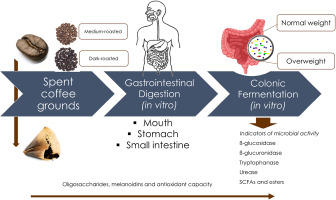Innovative Food Science & Emerging Technologies ( IF 6.3 ) Pub Date : 2020-01-03 , DOI: 10.1016/j.ifset.2019.102286 Ana Cecilia González de Cosío-Barrón , Angélica María Hernández-Arriaga , Rocio Campos-Vega

|
Spent coffee grounds (SCG; MR-medium and DR-dark-roasted) were submitted to an in vitro gastrointestinal digestion followed by a colonic fermentation using two microbiota communities (lean and overweight). The in vitro protective colonic effect of SCG was evaluated on colonic enzyme activities (β-glucosidase, β-glucuronidase, tryptophanase, and urease). The bioaccessibility of oligosaccharides and melanoidins, as well as colonic short-chain fatty acids (SCFAs) and ester production were determined and correlated with evaluated colonic enzymes. Melanoidins (8–17 mg/100 g) were highly correlated with antioxidant capacity (16–80 μmol Trolox/g sample; r = −0.78, p = 0.0001, ABTS), while raffinose was only detected during the colonic phase (1.22–4.23 mg/g) suggesting SCG use as human microbiota substrate. The extract obtained from MR-SCG colonic fermentation inhibited enzyme activity (up to 80%) at a rate similar to or even higher than inulin (used as a positive control during colonic fermentation). Using the same substrate (MR-SCG), microbial communities produced different amounts and SCFAs ester patterns, linked to the enzymatic inhibition effects. OW-microbiota produced the highest cumulative SCFAs (36 nmol/L; 55% more than L-microbiota). Molecular studies, and in vivo assays are needed to further elucidate the mechanisms exerted by SCG. Microbial communities need to be identified to determine the colonic effects of SCG and support their use as a functional food ingredient.
Industrial relevance
Our results support the added value of this industrial by-product to be used as a nutraceutical or functional ingredient for food products. Reducing food losses and waste ‘is essential’ to improve the sustainability of food systems, and contribute to broader systemic changes, including nutrition and health. SCG are digested under in vitro human gastrointestinal condition, where nutraceutical compounds are released from the matrix exerting health benefits, including antioxidant capacity, and positively modulating indicators of colonic microbial activity.
中文翻译:

用过的咖啡(阿拉伯咖啡)可积极调节结肠微生物活性的指标
将用过的咖啡渣(SCG; MR-中号和DR-深色烘焙)进行体外胃肠消化,然后使用两个微生物群落(瘦肉和超重)进行结肠发酵。在体外SCG的保护结肠作用于结肠酶活性(β葡糖苷酶,β葡糖苷酸酶,色氨酸酶,脲酶和)来评价。确定了寡糖和类黑素的生物可及性,以及结肠短链脂肪酸(SCFA)和酯的产生,并将其与评估的结肠酶相关联。黑色素(8–17 mg / 100 g)与抗氧化能力(16–80μmolTrolox / g样品高度相关;r = −0.78,p = 0.0001,ABTS),而棉子糖仅在结肠期被检测到(1.22-4.23 mg / g),表明SCG可作为人类菌群的底物。从MR-SCG结肠发酵中获得的提取物以类似于或什至高于菊粉(在结肠发酵过程中用作阳性对照)的速率抑制酶活性(最高80%)。使用相同的底物(MR-SCG),微生物群落产生了不同的量和SCFAs酯模式,与酶抑制作用有关。OW-菌群产生的累积SCFA最高(36 nmol / L;比L-菌群多55%)。分子研究和体内需要进行测定以进一步阐明SCG发挥的机制。需要确定微生物群落,以确定SCG的结肠效应并支持其用作功能性食品成分。
行业相关性
我们的结果支持了该工业副产品作为食品的营养保健品或功能性成分的附加值。减少粮食损失和浪费对于提高粮食系统的可持续性并促进包括营养和健康在内的更广泛的系统变化是“必不可少的”。SCG在体外人体胃肠道条件下进行消化,从基质中释放出营养保健品,对健康有益,包括抗氧化能力以及对结肠微生物活性的积极调节指标。











































 京公网安备 11010802027423号
京公网安备 11010802027423号